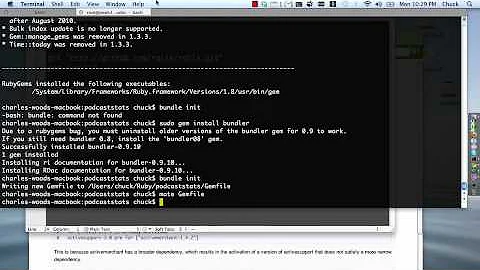How to deal with bundler updates (Gemfile.lock) in collaborative context?
Gemfile.lock should be version controlled. You should be committing any changes to it. When somebody (who you trust) updates it, you should run bundle install to install the gems currently locked in Gemfile.lock.
Just running bundle install will not update an existing Gemfile.lock. To do so, you need to run bundle update.
All that said, there are no actual changes to the versions in your Gemfile.lock. All that changed was the order of arguments for a few lines. You can safely merge those changes in or disregard them; the resulting Gemfile.lock will be (functionally) identical.
Related videos on Youtube
user664833
Updated on January 23, 2020Comments
-
user664833 over 4 years
I have been a lone programmer on a particular project, but now someone else has joined as collaborator. With just me in the picture,
bundlerupdates have been smooth, and I never thought twice aboutGemfile.lockbeing tracked by Git.The new collaborator ran
bundle installafter cloning the repo, andGemfile.lockwas updated as follows:Gemfile.lock
@@ -141,7 +141,7 @@ GEM rack-ssl (~> 1.3.2) rake (>= 0.8.7) rdoc (~> 3.4) - thor (< 2.0, >= 0.14.6) + thor (>= 0.14.6, < 2.0) raindrops (0.10.0) rake (0.9.2.2) rdoc (3.12) @@ -164,7 +164,7 @@ GEM sprockets (2.1.3) hike (~> 1.2) rack (~> 1.0) - tilt (!= 1.3.0, ~> 1.1) + tilt (~> 1.1, != 1.3.0) thor (0.16.0) tilt (1.3.3) treetop (1.4.10) @@ -175,7 +175,7 @@ GEM tzinfo (0.3.33) uglifier (1.3.0) execjs (>= 0.3.0) - multi_json (>= 1.0.2, ~> 1.0) + multi_json (~> 1.0, >= 1.0.2) unicorn (4.3.1) kgio (~> 2.6) rackThis change was pushed into a named branch off master. How am I supposed to deal with this change?
Thinking out loud: Do I merge the Pull Request on GitHub? Do I just pull from upstream without a Pull Request at first? Do I run a particular bundler command to sync things up with the other collaborator's
Gemfile.lock? Is there something the other collaborator could have done differently, so that they did not cause any gems to update (rather, just to download the gems specified in the existingGemfile.lock)? What are the best practices around this situation? -
ianpetzer over 11 yearsHaving your Gemfile.lock under version control is considered the best practice. This ensures that the same bundle of dependencies will be built wherever you install your application, whether it is another developer working on the source code, or the bundle for your production server.
-
hammady almost 7 yearsmake sure you both use the same bundler version so that the generated Gemfile.lock looks the same and not generate things differently which would be a false alarm commit

![[EN] Bundler 2 / Colby Swandale @0xColby](https://i.ytimg.com/vi/sZX7SK3hxk4/hq720.jpg?sqp=-oaymwEXCNAFEJQDSFryq4qpAwkIARUAAIhCGAE=&rs=AOn4CLDwzfd3ADjuk7JCQZeoNinlDriiOA)






